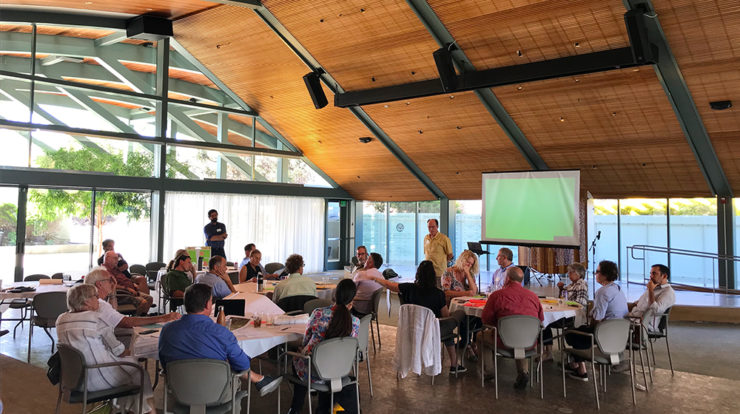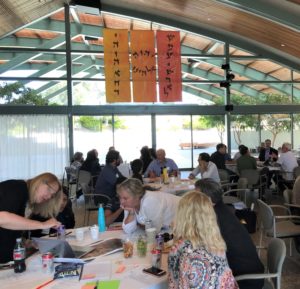

Project Profiles
Supporting Fire-Resilient Rebuilding in Malibu
Dakota Walker
Share
In July of 2019, Terrapin began a four month community engagement and support process for residents of Malibu, California, who lost homes in the 2018 Woolsey fire. The intent of the project, funded by the Malibu Foundation, was to come up with affordable means of applying resilience and sustainability concepts to the rebuilding process.
Since 1957, Malibu has had more than a dozen fires that have destroyed numerous homes. The 2018 Woolsey Fire destroyed 1,600 homes, more than 450 of which were in Malibu. The region is also prone to flash floods, mudslides and earthquakes. Changes to temperature regimes, drought and rainfall patterns are occurring as a result of climate change and are increasing the likelihood of more natural hazards for the Malibu community.
The Malibu Foundation was established in response to the Woolsey Fire, to support the community’s recovery process and improve its resilience to future disasters. Terrapin was contracted by the Malibu Foundation to organize and facilitate a resilient building workshop in which community members and expert advisors could work together to develop rebuilding strategies that were resilient, resource efficient, and cognizant of legal, financial, and regulatory hurdles.
The process began with in-depth community-member interviews to better understand the common challenges of the rebuilding process, and how Terrapin’s contribution would best support overcoming those challenges. Michael Kinsley, the community engagement expert who conducted the interviews, noted underinsurance, claims and regulatory burden, and a dearth of resources on resilient building and landscaping practices as the primary challenges for rebuilders.
 In the subsequent workshop, Terrapin brought in several expert advisors (see publication for full list of attendees) to lead discussions in a number of relevant topics including:
In the subsequent workshop, Terrapin brought in several expert advisors (see publication for full list of attendees) to lead discussions in a number of relevant topics including:
- Financing strategies, incentives, and planning
- Resilient and affordable building practices
- Net zero energy design
- Rapid and low-waste construction
- Site management and planting for fire-risk mitigation
The success of the workshop discussions was due, in part, to the structure of discussions. Workshop attendees were strategically divided into five tables. Expert advisors would circulate the tables, introducing key principles and opportunities for a particular topic, while community members, including homeowners, city planners, local design and construction professionals, and fire experts, helped to tease out feasible rebuilding strategies within the context of climate and community.
Drawing from those workshop insights, Terrapin developed the Malibu Rebuilder Guide, which lists 47 recommendations as means to combine resilience with easy, affordable, and fast rebuilding practices. While the content in this document was developed specifically for Malibu residents who lost their homes in the Woolsey Fire, much of the information is applicable to greater California and other fire-prone areas around the world.
Filed under:
Dakota Walker
Dakota Walker is an Associate Project Manager & Research Analyst at Terrapin Bright Green. He recently graduated summa cum laude from the University of North Carolina Asheville with a degree in Environmental Management and Policy. Dakota believes the genius of nature has yet to be matched by human innovation. He’s interested in finding new approaches to solving contemporary policy and design challenges that reflect the resilience and resourcefulness of natural systems.
Topics
- Environmental Values
- Speaking
- LEED
- Terrapin Team
- Phoebe
- Community Development
- Greenbuild
- Technology
- Biophilic Design Interactive
- Catie Ryan
- Spanish
- Hebrew
- French
- Portuguese
- Publications
- Occupant Comfort
- Materials Science
- Conference
- Psychoacoustics
- Education
- Workshop
- Mass Timber
- Transit
- Carbon Strategy
- connection with natural materials
- interior design
- inspirational hero
- biophilia
- economics of biophilia
- Sustainability
- wood
- case studies
- Systems Integration
- Biophilic Design
- Commercial
- Net Zero
- Resorts & Hospitality
- Energy Utilization
- Water Management
- Corporations and Institutions
- Institutional
- Ecosystem Science
- Green Guidelines
- Profitability
- Climate Resiliency
- Health & Wellbeing
- Indoor Environmental Quality
- Building Performance
- Bioinspired Innovation
- Biodiversity
- Residential
- Master Planning
- Architects and Designers
- Developers and Building Owners
- Governments and NGOs
- Urban Design
- Product Development
- Original Research
- Manufacturing
- Industrial Ecology
- Resource Management
- Sustainability Plans
- Health Care
- Carbon Neutrality


